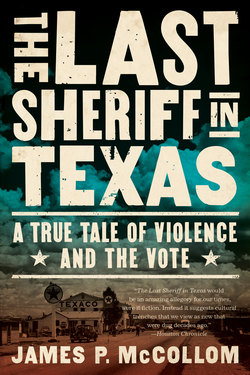Читать книгу The Last Sheriff in Texas - James P. McCollom - Страница 12
На сайте Литреса книга снята с продажи.
Оглавление6
Johnny spent Christmas of 1947 in Beeville and visited with folks downtown, in and out of the doorways on Main. He saw Mr. Schulz, his old boss from his soda jerk days at the pharmacy. He saw Mr. Raymond Brown, sitting in his customary chair outside Bagley’s newsstand. Mr. Brown, blind since age twelve, knew Johnny’s voice at once and asked him for details about law school. Blindness hadn’t prevented Raymond Brown from earning a law degree at the university. Inside the newsstand, he saw Dudley Dougherty, the town’s one legacy millionaire, absentmindedly leafing through the week’s new periodicals, which he would then decline to buy. At the American Café, he had coffee with Monte Hall, now managing the store his dad had founded as Hall’s Emporium fifty years before. Johnny went by the newspaper office to say hello to Camp Ezell, who asked him about his plans after graduation, taking notes.
The town was alive. On the three downtown blocks there were a half dozen cafés, not counting the soda fountain at Schulz’s pharmacy, and four barber shops: Walter Chesshir’s and the Rialto Barbers were across from each other on Main, the Post Office barber shop (run by Sid and Curly Hirst) and Bob Lothringer’s across from each other on St. Mary’s Street. Three banks, all locally owned, were within two blocks of each other. Three drugstores: Schulz’s, Conoly’s, and Ballard’s. Old man Jim Ballard sat out in front of Ballard’s carving small figurines and telling Texas stories. J. Frank Dobie used him as a source. Puss Malott’s was busy all day long: men shooting pool, playing dominos, smoking, standing at the bar and talking, standing outside and talking, where they could watch the traffic, mostly foot traffic, of the town. Down the street, the grand Kohler hotel cooled its spacious lobby with overhead fans. There was another coffee shop at the Kohler. People visited at the post office, at the Lou Anna bakery with its wonderful smells, at Burrough’s hardware, Lack’s, and Perry’s and Ferguson’s dime stores, where kids could walk around and look at tiny toys.
During the years of World War II, American boys mired in foreign mud and chaos dreamed of such order—warm houses, mown yards, clean neighborhoods where people didn’t lock their doors at night—far removed from European ruins and scorched Pacific beaches. Ohhmmm. Hooommme. At Christmas in 1947, the sense of homecoming was still powerful. All over town one heard Christmas songs and the sentimental music of the 1940s:
I’ll be seeing you, in all the old familiar places.
Kiss me once again; it’s been a long, long time.
I’ll be home for Christmas . . . if only in my dreams.
This place, this town, was all those dreams. Forty-five local boys hadn’t made it back alive. But Freddie Hobrecht and Viggo Gruy and Ed Brown had made it home. Freddie was a hero, a P-47 Thunderbolt pilot shot down behind enemy lines who captured a German soldier and brought him back with him. Viggo, commissioned early out of Texas A&M, had won the Silver Star in combat in France. Ed, another Aggie, halfback on the championship Beeville high school football team of 1934, had served on Omar Bradley’s staff. Leonard Kirkpatrick made it home from the navy and married Robatine Calkins, the fairest of the Beeville majorettes. A. W. Mussett came home and won the gorgeous Norma Sapp.
I’ll be home for Christmas . . . if only in my dreams.
Such a town. Such a town. With twelve cents, kids eleven years old could see a movie at the Rialto Theater—a worthy second cousin to the glorious Majestic and Aztec theaters in San Antonio—with its vaulted ceiling and artworks, carpets and drapes and air-conditioning. Texas, starring Glenn Ford and William Holden, was playing at the Rialto. The Rex was showing Eddie Dean in Arizona Trail and John Wayne in The Star Packer (Son of the Guardian Chapter 3) at the Saturday matinee.
At the Beeville hospital, there were flowers everywhere, so many that the nurses had nowhere to put them. Mrs. Ennis pleaded for people to stop sending flowers. Flowers kept coming. A telegram from the Carthage, Texas, sheriff’s department, verged on haiku:
Hold your head up.
We are with you.
A thug is a thug.
Place them one by one.
The twentieth century was nearing its midpoint. The Old West was long past, but Americans were not ready to let it go. Time magazine’s story about Vail Ennis, the hell-bent sheriff of Bee County, had proved that Texas was still Texas.
Time:
In Beeville’s Thomas Memorial Hospital, hothouse blooms banked all about his big room. Vail Ennis lay gravely wounded, his intestines riddled, a hip and arm ripped by bullets. But he was still alive.
Said a Beeville resident: “They might as well have gone out and hanged themselves as to pull a gun on Vail.”
